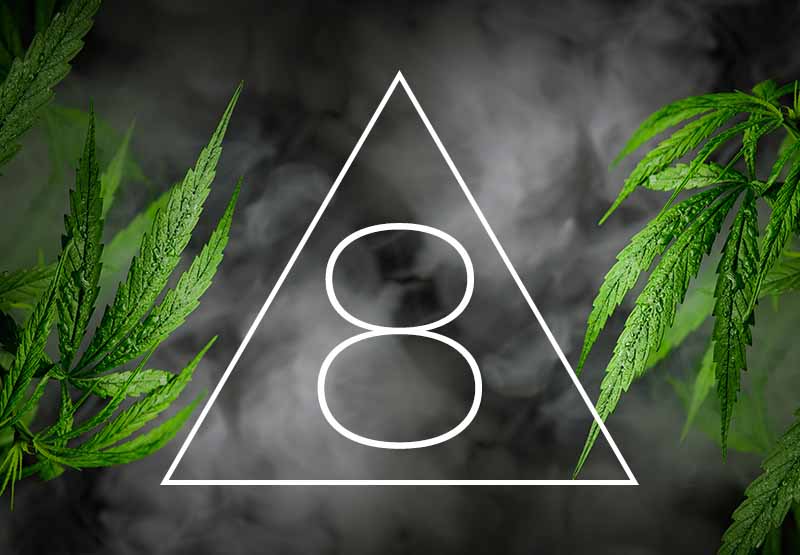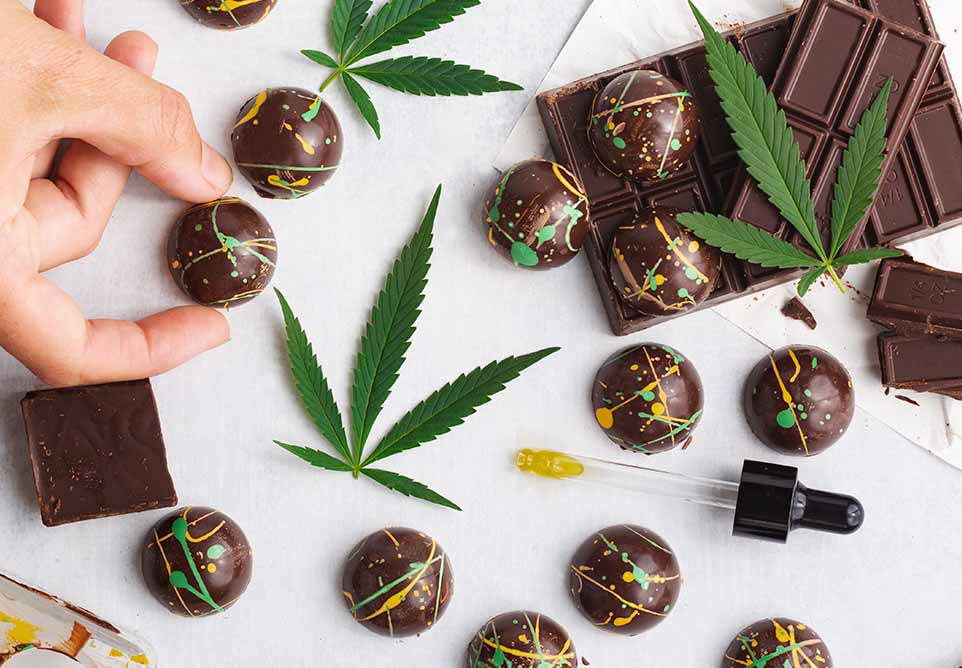Most people know that the cannabinoid known as delta-9-tetrahydrocannabinol is the psychoactive compound in marijuana that makes people feel high. Otherwise known as delta-9 THC, or THC for short, it is just one of over 100 cannabinoids that have been identified in cannabis.
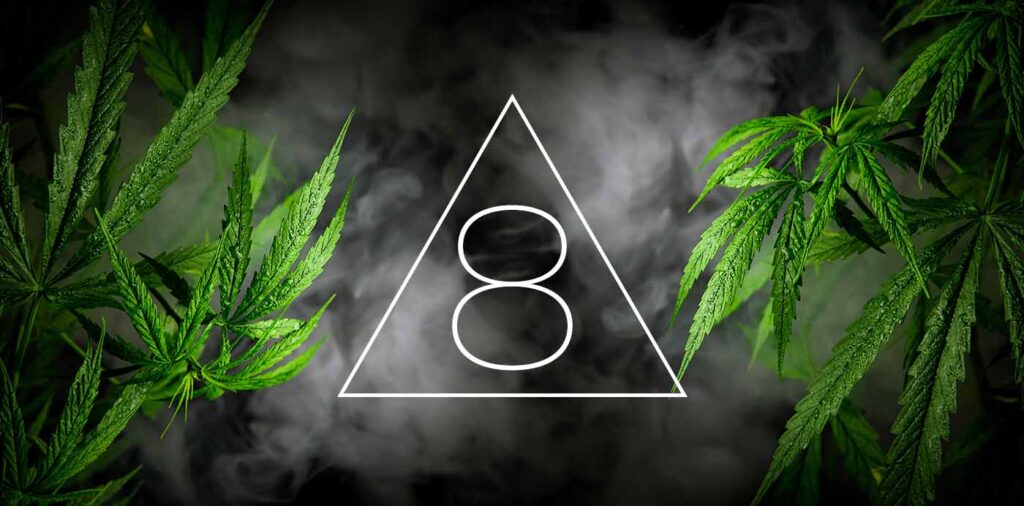
Another lesser-known cannabinoid that’s received some attention lately is Delta-8 THC. Although delta-8 THC can have psychoactive effects similar to delta-9 THC, it has shown to be less potent in studies conducted on animals.1
Not only that, but delta-8 THC does not occur in significant amounts in the plant naturally. And, this is just one of the concerns when it comes to delta-8 THC. We’ll explain why in a bit. First, let’s look at how deta-8 is made.
How is Delta-8 Made?
Since minimal amounts of delta-8 THC occur naturally in the cannabis plant, delta-8 is made from CBD that has been extracted from hemp. Once the CBD has been refined into an isolate, it is then synthesized into delta-8. It is this synthetic conversion process that concerns many including the FDA.
That’s because this synthetic conversion process involves the use of additional chemicals. And since the delta-8 market is unregulated, it becomes possible that unsafe processes could lead to products that are harmful to consumers.
Is Delta-8 THC Legal?
Like many things cannabis related, the legal status of delta-8 THC is not clear cut.
If the delta-8 is derived from hemp, then it’s considered to be legal by the federal government. But, if the delta-8 has been extracted from cannabis, then it’s considered illegal on the federal level.
Although delta-8 THC is currently legal in some states, some states have restricted its use to medical purposes. There are also a few states that have actually banned the use of delta-8 THC.
It’s interesting to note that in some states where the recreational use of cannabis has been legalized, like Colorado, delta-8 products have been banned. That’s why it’s important to first check with the regulations in your area. If you live in a state that’s banned delta-8, you should avoid purchasing and possessing delta-8.

Why is Delta-8 Legal?
Delta-8 THC is considered legal at the federal level because it is derived from hemp instead of cannabis. According to the Agriculture Improvement Act of 2018 the determination of whether a plant is classified as hemp or cannabis comes down to the amount of THC:
- Hemp is defined as a variety of cannabis that contains less than 0.3% THC
- Plants containing more than 0.3% THC are classified as cannabis.
How did they arrive at this 0.3% figure? Did they do some extensive study? Not really. It seems it was chosen somewhat arbitrarily. The story goes something like this.
Canadian scientist, Dr. Ernest Small, compiled a study in 1976 called, A Practical And Natural Taxonomy for Cannabis. The study defined 0.3% as the number to distinguish between low-THC cannabis from high-THC cannabis.2
The thing is, Dr. Small’s use of 0.3% as a threshold was intended for his 1976 study. Somehow, this number was adopted as the threshold to distinguish hemp from marijuana – even though it may not have been Dr. Small’s intention.
Learn more about: What is Cannabis? Is It Different from Hemp and Marijuana?
Can You Travel with Delta-8?
In order for your delta 8 to be legal it must be derived from hemp. But, just because it’s legal in the state where you live, it does not mean it’s legal in the state you are traveling to.

Currently, there are 21 states in the United States that have regulated, restricted, or banned delta-8. So, if you are traveling to states like Colorado, Missouri, or New York – know that these states have placed bans on delta-8 products.3
That’s why you should always check the status of Delta-8 in the state you are traveling to before you travel. You will also need to check with the airline you’re traveling with to make sure they have not placed restrictions on delta-8.
Is Delta-8 THC Safe?
Although delta-8 THC products have not been evaluated or approved by the FDA for safe use, the FDA has shared a few concerns regarding its safety. One of these concerns is the fact that Delta 8 products contain much higher levels of delta-8 than what occurs naturally in the hemp plant.
According to the U.S. Food & Drug Administration (FDA), “the natural amount of delta-8 THC in hemp is very low, and additional chemicals are needed to convert other cannabinoids like CBD into delta-8 THC (i.e., synthetic conversion).” 4
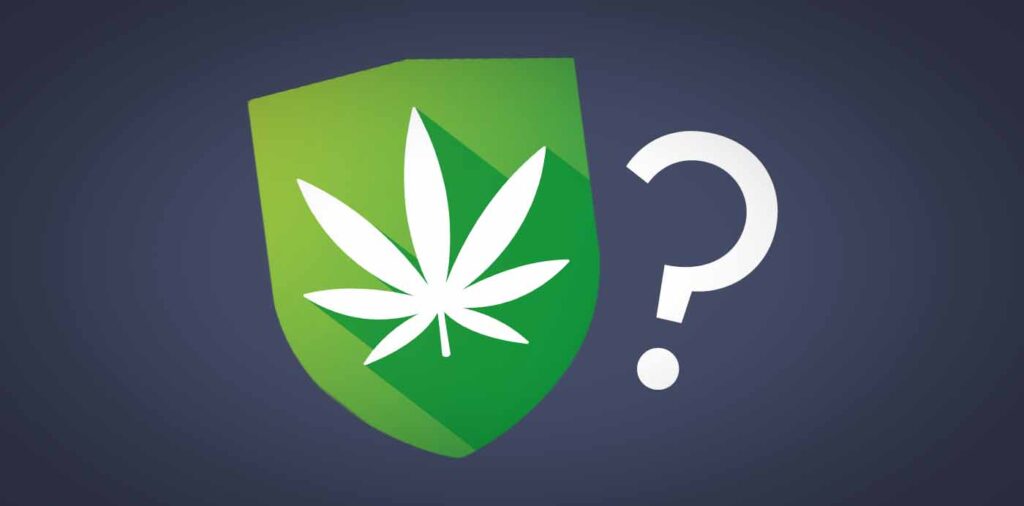
A few additional concerns the FDA has shared, include:
- The FDA has received adverse event reports involving Delta-8 THC products
- The synthetic conversion required to produce delta-8 could result in the use of unsafe chemicals
- Delta-8 products expose consumers to much higher levels of the substance than occur naturally in hemp
Does Delta-8 Get You High?
One of the first questions people ask when it comes to delta-8 is: does it get you high?
Yes it does. Although the high from delta-8 is milder than that of delta-9 THC, delta-8 does provide a high sensation. But, unlike delta-9, it tends to provide a milder more sedative effect – compared to the feelings of euphoria delta-9 THC is known for.
So, why does delta-8 provide a milder high?
To put it simply, delta-8 is not able to bind to cannabinoid receptors in our bodies, as well as delta-9 THC can. As a result, delta-8 tends to provide less psychoactive effects compared to delta-9 THC.
Does Delta-8 Smell Like Weed?
There are some delta-8 products that do smell like weed and there others that give off very little odor. For example, delta-8 tinctures and edibles give off virtually no scent of cannabis. The same goes for delta-8 vape cartridges.

Keep in mind that it’s the terpenes found in a particular strain that give cannabis its unique aroma. So, if you’re trying to keep the weed smell to a minimum, avoid delta-8 products that have terpenes added.
Delta-8 dabbing products are also known to give off a strong cannabis aroma. So, avoid these if you are trying to remain discrete.
Learn more about What Gets You High – THC or Terpenes?
How Long Does Delta-8 High Last?
The answer to this question will be different for all and will depend on a number of factors including the potency and method of consumption.
For example, when you vape delta-8 cartridges or smoke delta 8 flower you will tend to feel the effects within 10 minutes or less. Once the effects do kick in, they can typically last for about 1 – 2 hours.
Dabbing delta-8 concentrates, however, will provide different results. Consider that dabbing delta-8 concentrates can lead to effects lasting 2-5 hours. For first time users, the effects can last even longer.
Another popular way to consume delta-8 is through edibles. The problem with consuming delta-8 edibles is that the effects can be somewhat less predictable than smoking or vaping- especially for those consuming edibles for the first time.
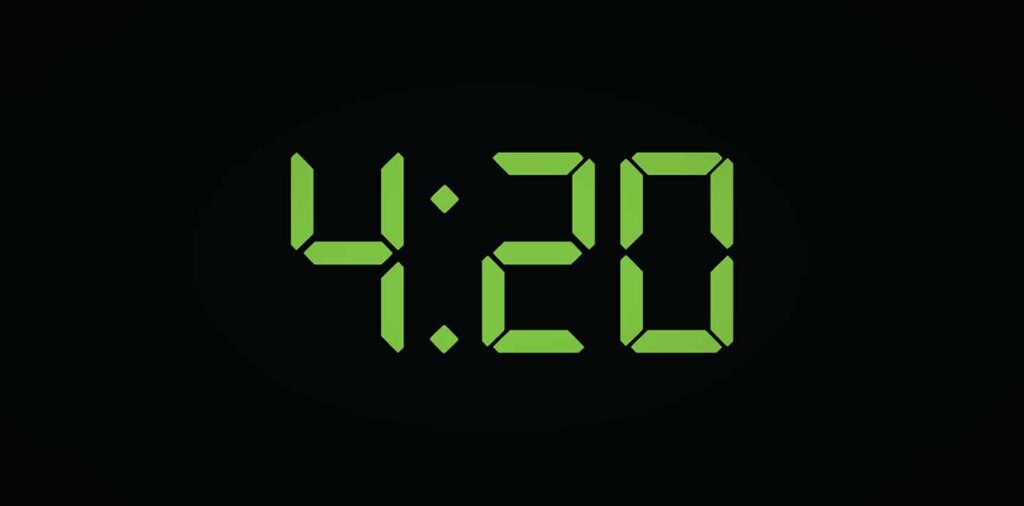
For those new to edibles, keep in mind that it can take longer to feel their effects compared to smoking or vaping. That is why it is best to start slowly with small doses. You can always consume more, but if you consume too much too quickly, it can result in an unpleasant experience.
How Long Does It Take For The Effects of Edibles To Kick In?
The amount of time this process takes will vary for each person. Depending on a number of factors – including the type of edible, its potency, your metabolism, and your tolerance – it can take anywhere from thirty minutes to a few hours to feel the effects.
How Long Do The Effects of Delta-8 Edibles Last?
Generally, the effects of consuming edibles will last much longer than smoking or vaping. When you consume an edible, its effects can be felt for up to six hours. For some, the residual effects of edibles can be felt for even longer.
So, if you are new to edibles, make sure to allow enough time for the effects to fully pass before you try to get back to any activities that require mental focus.
Learn more about the Different Types of Marijuana Edibles.
How Long Does Delta-8 Stay in Your System?
The length of time it will take to eliminate all signs of delta-8 THC from your system depends on several factors including how much you’ve consumed, how frequently you use it, and your metabolism.
Depending on these factors, Delta 8 can be detectable in your system anywhere from five to fourteen days. Someone with a slow metabolism may need two weeks to eliminate all delta-8 metabolites from their system, while someone with a faster metabolism may only need five days to clear it out of their system.
What’s the Difference between Delta-8 and Delta-9?
The difference between delta-8 and delta-9 basically comes down to chemistry. Both compounds have a double bond. As its name implies, Delta-8’s double bond occurs on the eighth carbon. With delta-9 the double bond occurs on the ninth carbon.
It is this double bond that’s believed to play a key role in the high sensation associated with THC. Both delta-8 and delta-9 bind to CB1 receptors in our endocannabinoid system. The reason delta 8 is much less potent than delta-9 comes down to the location of these double bonds.
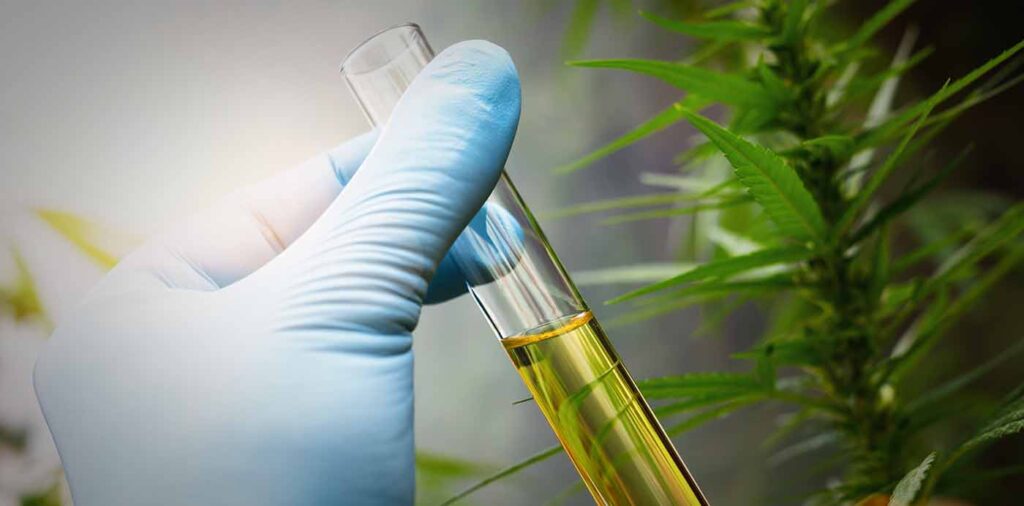
Does Delta-8 THC Lead to Positive Drug Test Results?
Although more research is needed, it is believed that repeated use of delta-8 products could result in a positive drug test. This is due to how similar delta-8 and delta-9 are chemically.
Is Delta-8 Bad for You?
There are a few risks that have been identified by the Food and Drug Administration (FDA) that could make delta-8 products bad for you.
First, the delta-8 market is unregulated. So, consumers can not know for sure that they’re consuming products that are safe and pure.
Another major concern is one we mentioned before. Delta 8 does not occur in significant amounts in nature. Combine this with the fact that the effects of delta-8 tend to be less pronounced than delta-9 THC and you have a situation where people could end up taking much larger doses of a substance than nature might have intended.
It’s for these reasons, and more, that many believe that delta-9 THC products are safer when compared to delta-8.
Perhaps that is why the Centers for Disease Control and Prevention (CDC) and the Food and Drug Administration (FDA) have both issued warnings about the safety of delta-8 products.
Between December of 2020 and June of 2021, Poison Control Centers received more than 650 calls about delta-8 consumption. Most calls were about symptoms similar to the effects of consuming too much cannabis.5
Why Not Put the Power of More than 100 Cannabinoids to Work for You?
Besides some of the concerns shared by the FDA, another potential downfall of Delta-8 THC products is that they focus exclusively on just one cannabinoid – and at much higher levels than occur naturally.
Most would agree that putting the power of more than 100 naturally occurring cannabinoids and terpenes to work for you seems like a more practical way to achieve the quality of life enhancements that are possible with cannabis.
Live in a State with a Bloom Dispensary?
If you live in a state with a Bloom dispensary, we invite you to take advantage of our complimentary patient consultations.
During this free consultation, our Patient Care Specialists will take the time to get to know you, so we can help to identify the cannabis products with the cannabinoid and terpene profiles that are best for you.
Take the first step toward a better quality of life and schedule your free consultation today.
Consultations available by phone, in-person, or online.
- https://www.goodrx.com/well-being/substance-use/is-delta-8-thc-safe
- 0.3%, the Magic Number: What This THC Threshold Is All About | Pure Craft
- Where is Delta-8 THC Available or Banned? (Map of States)
- 5 Things to Know about Delta-8 Tetrahydrocannabinol – Delta-8 THC | FDA
- https://www.goodrx.com/well-being/substance-use/is-delta-8-thc-safe

